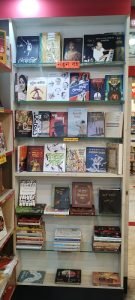Kolkata-based Read Bengali Bookstore made its start in 2018 by selling Bengali books. Its goal is to encourage people to read more Bengali books and provide writers, local unrecognized booksellers, and small and big Bengali publishing houses an opportunity to uplift the Bengali book market by taking them to readers across India, and eventually across the globe.
“I have been in the English book distribution business since 2008. In 2013, we planned to publish our own book in Bengali. After publishing, we saw there was no proper channel to sell or distribute Bengali books except a few shops on Kolkata’s College Street,” said Pritam Sengupta, director, Read Bengali Bookstore, a unit of Bhasa Ventures.
At that time, online bookshops were new and growing, so they set up their first Facebook page and tried selling books via the social media platform. “Since Facebook was not the proper place for marketing books at that time, we were struggling to get proper sales,” Sengupta said.
Sengupta took up the challenge and set up an eCommerce website dedicated only to Bengali literature – readbengalibooks.com, and eventually set up a physical bookstore – Read Bengali Bookstore – at Kalighat in Kolkata.
Apart from Bengali books, Read Bengali Bookstore houses a small collection of children’s books in English. Sengupta feels that if a kid visits their store and doesn’t know how to read in Bengali, (which sometimes happens) he/she should at least grab something interesting to read.

According to Sengupta, Read Bengali Bookstore isn’t for readers who already know what to read. The main purpose behind Read Bengali Bookstore is to enable the reader to browse its vast collection of Bengali books at leisure and select what appeals to them. The bookstore, he says, has a huge collection of books that one might not be able to find easily otherwise.
Apart from regular bestsellers and all-time classics, they focus on two major categories – new releases that are in demand, and odd books whose contents are relevant. The bookstore has a vast collection of books on Indian history, the freedom struggle, the partition of Bengal, Bengali literature’s bestselling genre – thrillers and horror books, and books on and about Kolkata.
Its other USP is its huge collection of Bengali merchandise, including coffee mugs, T-shirts, coasters and fridge magnets. It is an experience store, Sengupta said, adding Read Bengali Bookstore participates in major book fairs in and around Kolkata and has a strong online presence all over India.
Challenges in Bengali book industry
The Bengali book publishing market is disorganized and distribution is the missing link. Publishers become booksellers, which limits their sales as they cannot reach out to a bigger audience. eCommerce has partly solved the issue but a lot more can be done. However, making books available at a physical bookstore is a must and there is already a shortage of good bookshops outside College Street, the biggest publishing hub in Kolkata. Modern bookshops should be the next target to keep the Bengali book market growing, he said.
According to Sengupta, there is still a huge reader base for Bengali literature along with good authors, but it is diminishing due to three reasons. First, these days good writing that leaves a lasting effect has become rare. There are many bestselling Bengali authors but few can maintain the consistency after their first few books. He said publishers are more to blame than authors.
“I feel bringing out the best from an author is the duty of publishers and editors. Nowadays, there are hardly any good editors who can bring out the best in an author’s writing. Publishers print whatever an author writes.”
The second reason is that everyone is a publisher, he says. If one publisher rejects a book, then someone else is ready to publish it. If no one is ready to publish, then thanks to print on demand (POD), the author himself publishes the book. “The book trade is, thus, getting flooded with works that should not have seen the day’s light, even though there are many great self-publishing authors. Due to this, the editors are becoming publishers and authors are becoming editors,” he said.
With POD and online selling, nowadays one can publish in as little as half the cost of a book and check the market. So the publishers who do not have a good distribution channel publish very few books and once they are sold, they move on to the next project, he said. “This way many good books just die and the readers are deprived of these gems, which if properly distributed might have reached a bigger section of readers. Today, Bengali books hardly inspire any movies, which used to be a great source of book promotion,” he added.
Trends in Bengali book publishing
Thrillers and horror have always been the bestselling segment in Bengali publishing. Nowadays, a few more categories are doing very well – science fiction, fantasy, Indian history, Indian freedom struggle, memoirs, and short stories.

New authors are getting good readership but they need to produce more good writing, he said. Old wine in a new bottle is also ‘the in thing’ as many all-time favorite classics are being republished in new attractive getups, targeted more at the younger generation. Read Bengali Bookstore has its own publishing house – Bhasa Classics, which publishes all-time classics from Rabindranath Tagore to Bibhutibhushan Bandyopadhyay, and many more.
Bhasa, Read Bengali Bookstore’s parent company, was set up as a regional language marketing company, Sengupta said, adding books are just a medium for marketing languages along with merchandise such as T-shirts, coffee mugs, and fridge magnets. “We want to explore the different languages of India and encourage the next generation of readers to know their roots. Indian culture has a rich heritage of diverse Indian languages. To keep the culture alive, we have to keep the languages relevant and happening,” he said. Bhasa plans to set up a similar platform for Hindi books.
“Bengali book publishing is a growing market but we would like to see more professional full-time publishers with good setup and knowledgeable people,” Sengupta shared. “Many Bengalis don’t stay in West Bengal anymore, so to reach out to them we need to focus more on parallel distribution channels and innovative marketing ideas. But it all boils down to one thing – how good the new authors are writing. To bring new readers, we need new best-selling authors too,” he concluded.


















